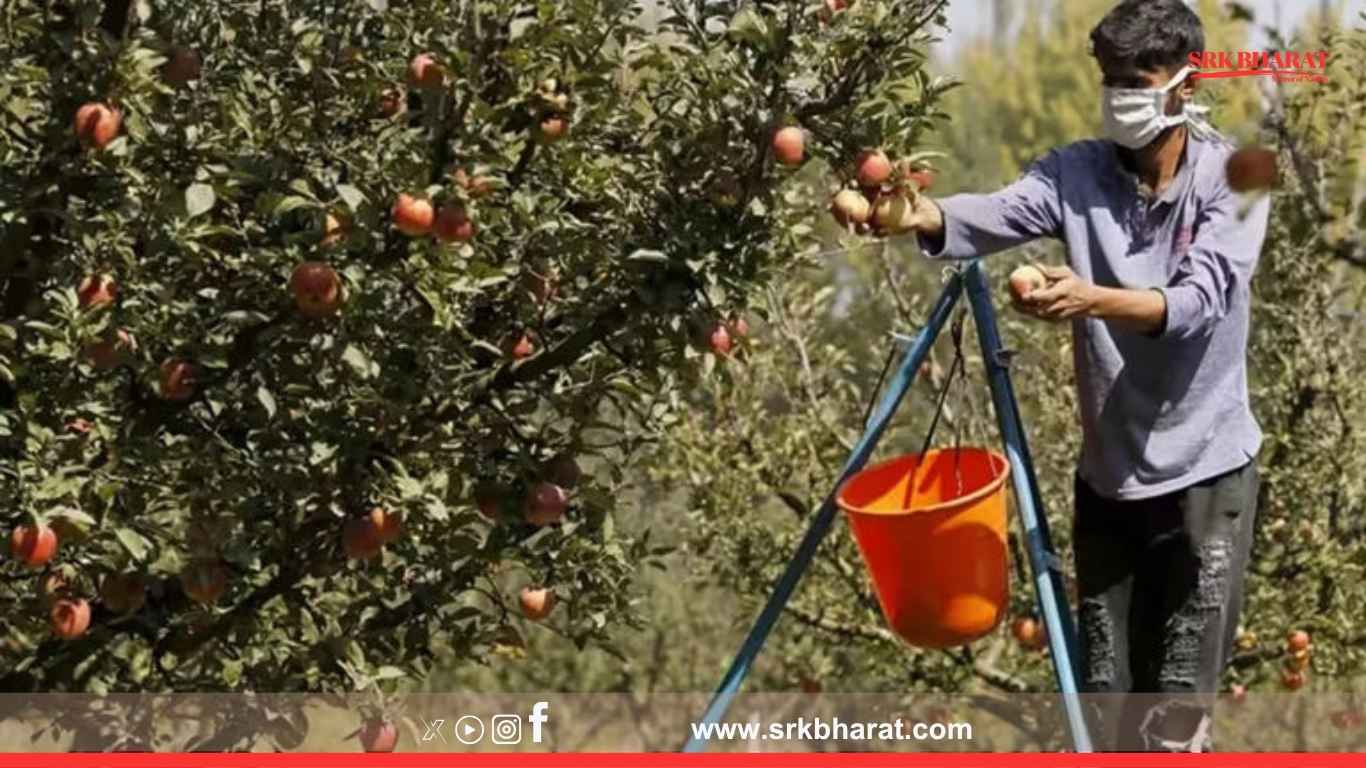In a major assurance to fruit growers of Jammu and Kashmir, Union Minister for Commerce and Industry Piyush Goyal said that the government will “look into import protection measures” to safeguard the interests of local apple producers, who are reeling under low market prices and stiff competition from imported Iranian apples.
The context of growers’ distress
During an interaction with fruit growers and traders at Sopore Fruit Mandi – Asia’s second-largest fruit market – in north Kashmir, Goyal acknowledged their concerns regarding declining rates, mounting debts, and threats posed by cheap imports flooding the market. Farmers highlighted how Iranian apples, often routed through Afghanistan under SAFTA concessions, are severely undercutting local produce.
“Our apples do not get the right prices. Imported Iranian apples are sold cheaply, affecting our livelihood badly. We need immediate protection,” a senior fruit trader told Goyal.
Government’s response to growers’ concerns
In his address, Piyush Goyal stated:
“I have listened to all your issues. The Government of India will certainly look into what kind of import protection can be given to ensure fair returns to our Kashmiri apple farmers.”
He emphasised that while India remains committed to free and fair trade under WTO obligations, protecting local livelihoods is a top priority.
Key demands of Kashmir apple growers
Growers and trader associations submitted a detailed memorandum listing their urgent demands:
- Ban or restrict import of Iranian apples to protect domestic growers’ prices.
- Implement Minimum Support Price (MSP) for apples to ensure fair returns.
- Ensure timely disbursement of Market Intervention Scheme (MIS) funds.
- Expedite construction of Controlled Atmosphere (CA) storage facilities for better price realisation.
- Improve road connectivity to ensure uninterrupted supply chains, especially during peak harvest.
- Waive off loans or restructure debt under the Kisan Credit Card (KCC) scheme to reduce financial distress.
Why Iranian apple imports are hurting Kashmir’s market
| Factor | Impact |
|---|---|
| Lower import prices | Iranian apples enter the market at 40-50% lower prices due to lesser production costs and duty benefits under regional trade agreements. |
| Smuggling loopholes | Routing through Afghanistan under SAFTA exemptions causes revenue losses and unfair price competition. |
| Market preference shifts | Traders opt for cheaper imported apples, leaving Kashmiri growers with unsold produce. |
| Quality difference perception | While Kashmiri apples are premium quality, cost-sensitive retailers prefer lower-priced imports. |
Possible import protection measures
Policy experts suggest that India can explore the following options under WTO-compliant mechanisms:
- Imposing countervailing duties or quality restrictions on Iranian apples routed via Afghanistan.
- Reviewing SAFTA exemptions misuse to plug revenue leakages and unfair market practices.
- Introducing tariff-rate quotas (TRQs) to limit import quantities without violating trade pacts.
- Enforcing stringent phytosanitary and food safety standards, ensuring only certified quality produce enters the market.
Piyush Goyal’s broader assurance to the horticulture sector
During his visit, Goyal also assured:
- Expansion of cold chain infrastructure and CA storage capacity in Kashmir under MIDH and NHB schemes.
- Promotion of Kashmir apples in export markets through APEDA branding support.
- Training and integration of local growers with e-NAM and ONDC platforms to connect them directly with national buyers.
- Development of a dedicated Kashmir Apple Promotion Board to address pricing, logistics, branding, and export facilitation holistically.
Industry and expert reactions
Bashir Ahmad Basheer, Chairman, Kashmir Valley Fruit Growers Cum Dealers Union, said:
“We welcome the Commerce Minister’s assurance. But unless imports are regulated and MSP is implemented, growers will continue to suffer losses.”
Policy economist Dr. Nisar Ahmad noted:
“A WTO-compliant smart tariff coupled with branding and post-harvest support is essential. Blanket bans are difficult but targeted duties and quality checks can protect local farmers effectively.”
Economic significance of apple cultivation in Kashmir
| Aspect | Details |
|---|---|
| Area under cultivation | Over 1.6 lakh hectares |
| Annual production | ~2 million metric tonnes |
| Contribution to horticulture GDP | 70% |
| Employment dependency | Directly employs over 3.5 lakh families |
Challenges beyond imports
While cheap imports have aggravated the crisis, growers also face:
- Post-harvest losses exceeding 30% due to lack of modern storage and packaging.
- Poor branding, with Kashmiri apples losing premium positioning in national markets.
- Transportation bottlenecks during harvest seasons, leading to spoilage.
- Rising input costs with stagnant market prices, eroding profit margins.
Recent initiatives by the government
The Centre and J&K administration have undertaken:
- Approval of ₹500 crore apple cluster development scheme under the PMFME framework.
- Strengthening Farmer Producer Organisations (FPOs) for better market linkages.
- Upgradation of Sopore Mandi under the World Bank-funded Jhelum Tawi Flood Recovery Project, with improved grading, cold storage, and auction facilities.
Future outlook for the sector
Experts argue that import protection alone is not a silver bullet. A comprehensive strategy focusing on:
- Quality branding to differentiate Kashmiri apples in competitive markets.
- Expansion of export footprints to Gulf and South-East Asia where premium pricing is achievable.
- Encouraging adoption of high-density plantation technologies for improved yields and disease resistance.
- Streamlining institutional credit flows with interest subvention to reduce grower indebtedness.
Conclusion
Piyush Goyal’s assurance to explore import protection for Kashmir’s apple growers has infused hope in the Valley’s horticulture sector. However, growers await time-bound action on duties, market intervention schemes, and infrastructural upgrades to stabilise their livelihoods. The coming months will test the government’s resolve to balance trade commitments with domestic welfare for the largest apple-producing region in India.
Disclaimer: This news article is for informational purposes only. It summarises public statements, industry representations, and policy options discussed in open forums. Any future decisions or tariff changes remain subject to government notifications and international trade agreements.











